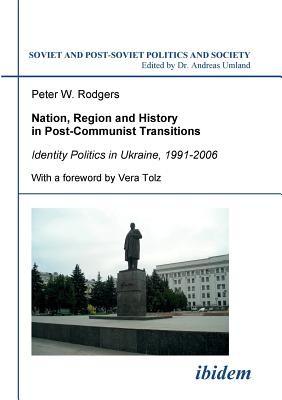
- We will send in 10–14 business days.
- Author: Peter W Rodgers
- Publisher: Ibidem Press
- ISBN-10: 3898219038
- ISBN-13: 9783898219037
- Format: 14.8 x 21 x 1.1 cm, minkšti viršeliai
- Language: English
- SAVE -10% with code: EXTRA
Nation, Region and History in Post-Communist Transitions. Identity Politics in Ukraine, 1991-2006 (e-book) (used book) | bookbook.eu
Reviews
Description
Since independence in 1991, issues of nation and identity have become highly debated topics in Ukraine. This monograph explores not only how national identity is being (re)constructed by the Ukrainian state, but also the processes by which it is negotiated through society. The central argument of this work is that too much attention, concerning identity in Ukraine, has focused on markers of ethnicity and language. Instead, the author advocates a regional approach, engaging with the issue of how Ukraine's regional differences affect nation-building processes. Following the tumultuous events of the 'Orange Revolution', the view of Ukraine as a country inherently 'divided' between 'East' and 'West' has (re)emerged to become a popular explanation for political events. The study outlines the necessity for academics, policymakers and indeed politicians to veer away from this simplistic 'West versus East' divide. The book advocates an analysis of Ukraine's unique brand of regionalism not in terms of divisions, but in terms of regional differences and diversity. The author deconstructs the concept of 'Eastern Ukraine' by focusing on three Ukrainian localities, all adjacent to the Ukrainian-Russian border. The study examines how individuals provide 'their' own understanding of the place of their region within the wider processes of nation building across Ukraine. In doing so, the book develops a 'regional' approach to the study of identity politics in Ukraine.
EXTRA 10 % discount with code: EXTRA
The promotion ends in 22d.18:22:00
The discount code is valid when purchasing from 10 €. Discounts do not stack.
- Author: Peter W Rodgers
- Publisher: Ibidem Press
- ISBN-10: 3898219038
- ISBN-13: 9783898219037
- Format: 14.8 x 21 x 1.1 cm, minkšti viršeliai
- Language: English English
Since independence in 1991, issues of nation and identity have become highly debated topics in Ukraine. This monograph explores not only how national identity is being (re)constructed by the Ukrainian state, but also the processes by which it is negotiated through society. The central argument of this work is that too much attention, concerning identity in Ukraine, has focused on markers of ethnicity and language. Instead, the author advocates a regional approach, engaging with the issue of how Ukraine's regional differences affect nation-building processes. Following the tumultuous events of the 'Orange Revolution', the view of Ukraine as a country inherently 'divided' between 'East' and 'West' has (re)emerged to become a popular explanation for political events. The study outlines the necessity for academics, policymakers and indeed politicians to veer away from this simplistic 'West versus East' divide. The book advocates an analysis of Ukraine's unique brand of regionalism not in terms of divisions, but in terms of regional differences and diversity. The author deconstructs the concept of 'Eastern Ukraine' by focusing on three Ukrainian localities, all adjacent to the Ukrainian-Russian border. The study examines how individuals provide 'their' own understanding of the place of their region within the wider processes of nation building across Ukraine. In doing so, the book develops a 'regional' approach to the study of identity politics in Ukraine.


Reviews